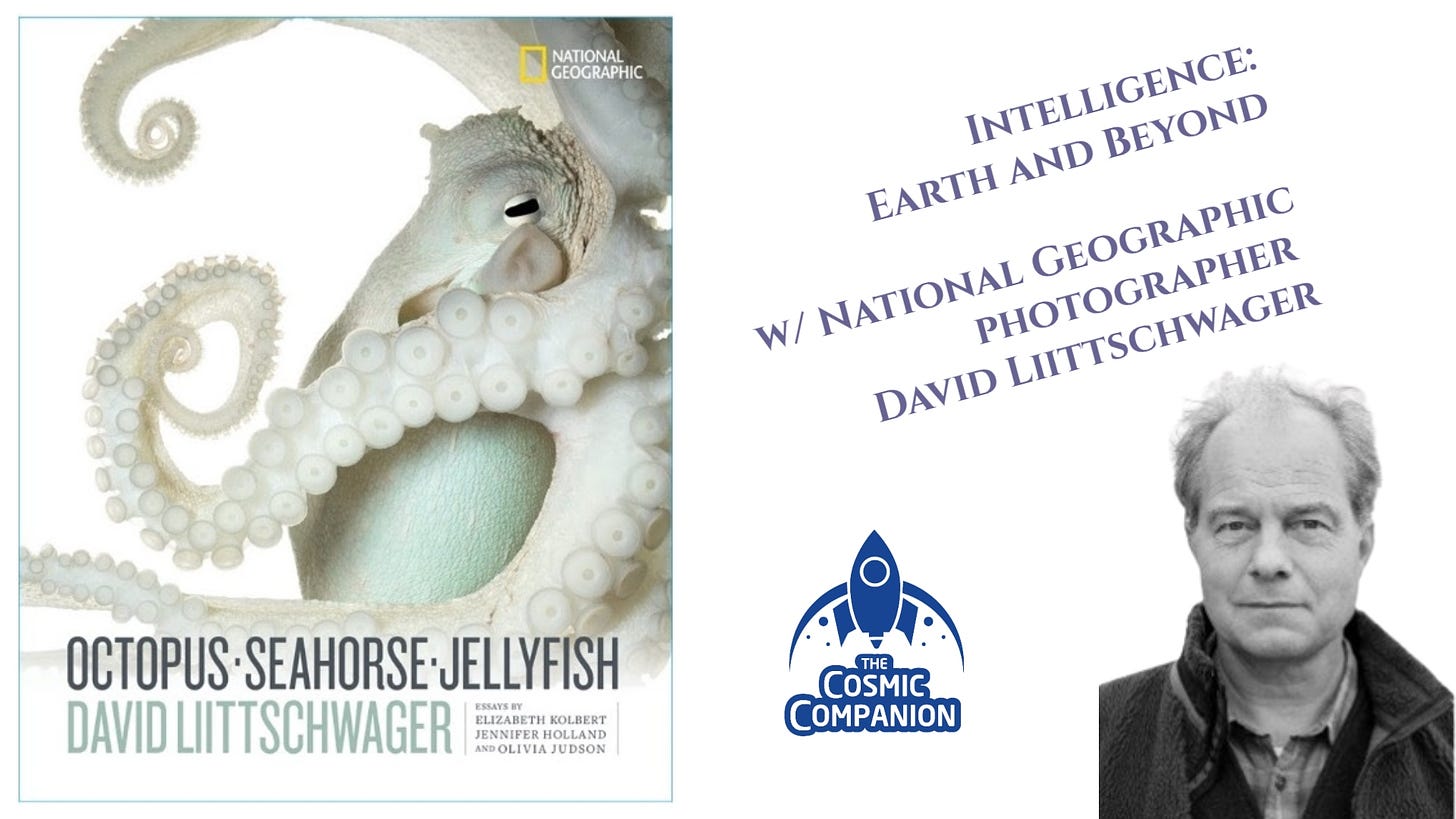Examining the nature of intelligence and the intelligence of nature with National Geographic’s David Liittschwager
What is intelligence? How do we see it in other animals? And how might we recognize it on other worlds?
Humans often like to think we are an intelligent species. And, perhaps, that may hold a kernel of truth. We did befriend cats, so…
Speaking of which (because, why not?) intelligence is not, in any way, limited to only our own species. In order to understand intelligence, we must recognize the trait among other species. And we must also discuss what it means for a species to be intelligent.
Full scripted transcript continues below for VIP members!
Join us starting 19 April as we celebrate Earth Day with Katherine Calvin, NASA’s Senior Climate Advisor! Also - a sneak preview of our upcoming interview with Time Magazine's first Hero of the Planet, oceanographer Sylvia Earle!
Thanks for being a subscriber!
James
VIP subscribers - Read the full scripted transcript below!
VIP Extras!
Transcript (cont.)
Typically, one might define intelligence as the ability to think, learn, solve problems, and adapt to new situations.
The seventeenth-century French philosopher René Descartes reasoned that he must exist, since he was asking the question of his own existence — hence “I think; therefore I am.” His intelligence allowed him (in his mind) to prove his own existence — how meta!
Trying to measure individual intelligence is difficult enough, much less the species as a whole. This problem becomes even more difficult when we try to quantify intelligence in other species.
Researchers often measure how animals react to experiences far beyond their normal experience, such as seeing themselves in mirrors, or responding to commands from humans. These tests may not be a fair measure of intelligence for species whose brains are wired far differently than our own.
Crows and other animals use simple tools — a talent once thought to be exclusively human. Language — another distinction of intelligence once thought to be exclusively human — is now recognized in the behavior of bees, dolphins, apes, and even prairie dogs. Remarkably, a recent study out of the UK found that even colonies of mushrooms might have their own language of up to 50 “words,” carried by spikes of electricity.
Other creatures — including Beluga whales — have even been known to mimic the sound of human beings. Speaking of which, the mimic octopus has learned to, well, mimic the look and behavior of several other species of aquatic sea life.
The marine world is filled with a wide variety of lifeforms, each possessing its own form of intelligence. Perhaps no creature has such a strange intelligence as the octopus.
The Netflix documentary My Octopus Teacher, released in 2020, struck a chord with millions of viewers. This narrative of the relationship between a human diver and an octopus showed first-hand (eight-tentacled?) how these creatures use their intelligence to navigate their aquatic world. The team that created My Octopus Teacher have also recently put out a magnificent new book, Underwater Wild.
A pioneer and leader in nature photography, National Geographic recently produced a coffee table book filled with stunning photography of three of the most-curious creatures in the ocean. We talk with photographer David Liittschwager about his new book, Octopus Seahorse Jellyfish.
The human race is very likely to discover life on other worlds in the coming years or decades. Very likely, this will be found in the chemical markers of biology seen in the atmospheres of distant worlds.
But the ocean worlds of our own solar system beckon to us from across the expanse of space. Europa, one of the four large moons of Jupiter, is home to vast oceans of water. And Saturn’s sixth-largest moon, Enceladus, may also house vast bodies of water.
Each of these worlds might possibly, be home to alien life far different than anything we have ever seen on Earth.
If there is life on one or more of these worlds, we are unlikely to spot obvious signs of intelligence from these extraterrestrial beings.
Finding life of any sort on other worlds will be a monumental moment for the human race. Finding even simple one-celled organisms in the alien oceans of the water worlds of our solar system would change views of the Cosmos.
But the most unequivocal sign of life outside the Earth would be the detection of a message from a distant world. If such a message were intended as a message-in-a-bottle to distant worlds, it might possibly be seen as a simple mathematical series — the first 10 digits of pi, perhaps, or a string of prime numbers.
However, the Universe is bathed in radio waves from a wide range of natural sources. And if extraterrestrials are like us, most of the signals they produce — similar to radio and television transmissions — are not meant to be seen or heard by beings on other worlds (that’s us).
Recognizing signs of intelligence in the vast communications wasteland of an alien species would be extremely challenging. It’s hard enough to find intelligence in the television shows put out by human civilizations. Such evidence is likely to be found within the wash of electromagnetic radiation which constantly engulfs us.
The more we learn about intelligence, the more we see it in other beings. By learning more about creatures around us, and how they think, we might learn more about intelligence which might be found beyond Earth, in the depths of the Cosmos.
Join us next week, as we celebrate Earth Day! We will be joined by Dr. Katherine Calvin, Chief Scientist and Senior Climate Advisor for NASA!
Clear skies!
Thank you so much for being a VIP subscriber!
James






Intelligence: Earth and Beyond with David Liittschwager - The Cosmic Companion 12 April 2022